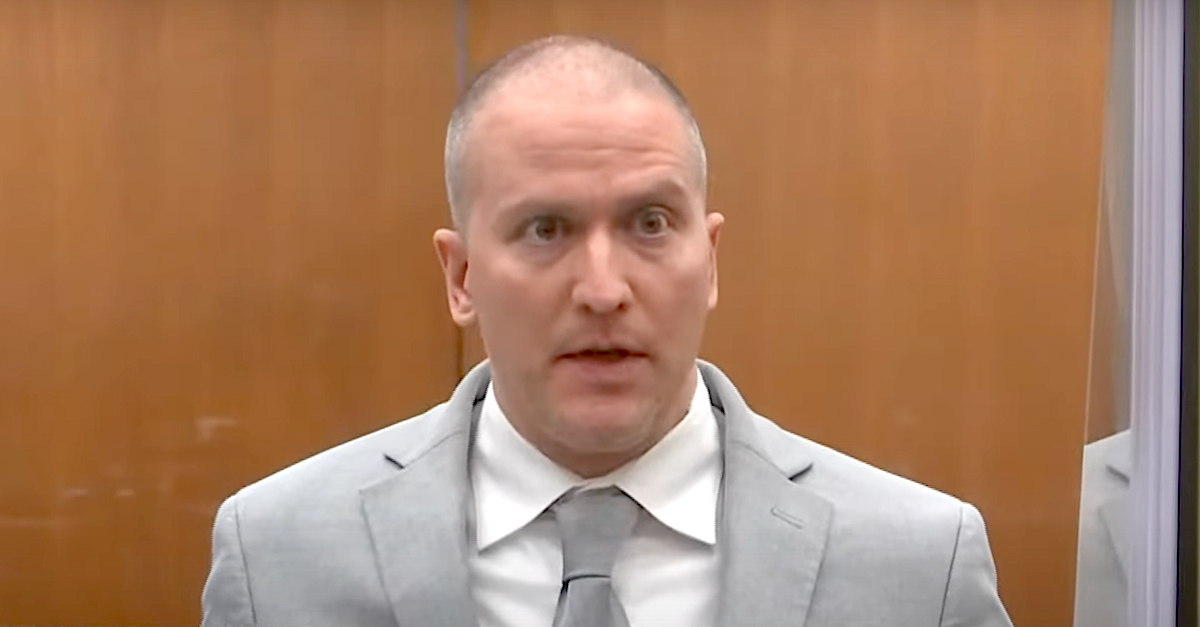
Derek Chauvin appears at a June 25, 2021 sentencing hearing in a Minnesota state district court. (Image via the Law&Crime Network.)
Derek Chauvin, the former Minneapolis police officer convicted of George Floyd’s murder, will challenge the jury’s verdict in a Minnesota appellate court on Wednesday.
His attorney William F. Mohrman has argued that the “saturation news coverage” that greeted the case “poisoned” the jury. Chauvin received a 22.5 year sentence, following his convictions on charges of second-degree unintentional murder, third-degree murder, and second-degree manslaughter.
Crunching numbers on the thousands of articles on the case that appeared in the local press — on top of national and international coverage — Chauvin’s legal team called the pre-trial publicity “more extensive than any trial that ever in Minnesota.” Chauvin’s defense team counted more than 1,000 stories and articles with the ex-officer’s name in local TV stations WCCO and KARE 11. And the general tenor of the news coverage was “overwhelmingly hostile,” Mohrman wrote.
Chauvin’s crimes of conviction galvanized a national movement that erupted into protests and riots in the summer of 2020.
On May 25, 2020, Chauvin was caught on tape kneeling on Floyd for 9.5 minutes, while arresting him for his alleged use of a $20 counterfeit bill at a nearby store. Floyd could be seen and heard in a bystander’s cell phone video gasping for air, and his dying words, “I can’t breathe,” became a protest slogan that resonated internationally.
Though the demonstrations were widely viewed as a national reckoning on racial justice, Chauvin’s defense team focused on their more violent manifestations in their appellate brief.
A day after Floyd’s death, protests gathered at the Minneapolis Police Department’s Third Precinct, where a squad car was burned and the building damaged. Gov. Tim Walz (D) activated the National Guard on May 28, 2020.
“When the riots ended, buildings were destroyed throughout the metropolitan area,” Chauvin’s appellate brief states. “Two individuals died […] Property damage exceeded $500,000,000–the second most destructive riots in American history.”
The three-member panel at the Minnesota Court of Appeals includes Judges Denise D. Reilly, Peter M. Reyes, Jr., and Elise Larson. It is the state’s intermediate appellate court and may not represent the final word on Chauvin’s murder charges, should he choose to appeal the case further.
Whatever Minnesota’s judiciary decides regarding his murder charges, Chauvin will likely face decades of imprisonment because both federal and state prosecutors convicted him in connection with Floyd’s death.
For the Justice Department’s case, Chauvin struck a plea deal that led to a 21-year sentence for civil rights violations. The federal sentence came after the Justice Department negotiated a plea deal that gave the judge very little discretion over Chauvin’s punishment.
Chauvin’s federal prosecution also unearthed another civil rights abuse that preceded the Floyd case.
In 2017, a Black teenager said that he also told Chauvin he couldn’t breathe during an incident that autumn, and in that case too, the officer put his knee on the then-14-year-old’s neck.
“Defendant Chauvin, without legal justification, held Juvenile 1 by the throat and struck Juvenile 1 multiple times in the head with a flashlight,” the indictment related to that case read. “This offense included the use of a dangerous weapon — a flashlight — and resulted in bodily injury to Juvenile 1.”
Chauvin pleaded guilty to violating Floyd and that boy’s rights through an agreement filed on Dec. 15, 2021. That agreement included a waiver of appeal.